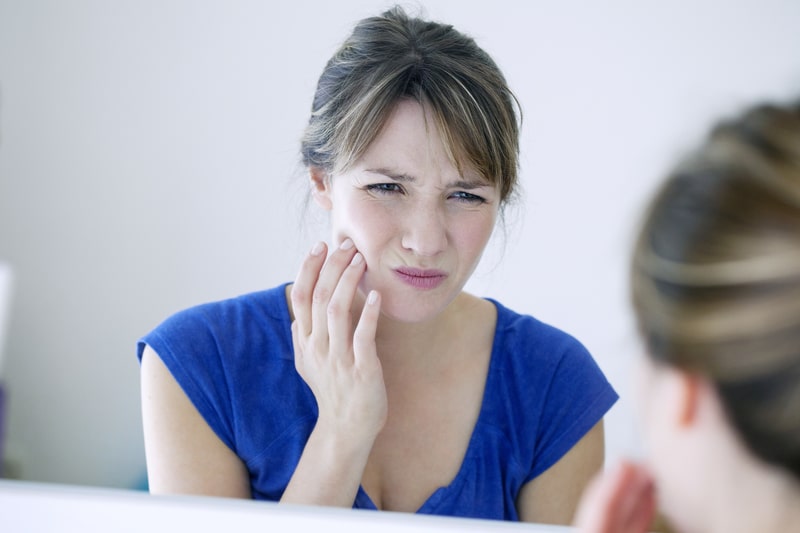Help for Grinding Your Teeth


Do you wake up in the night and realize that you’ve been grinding your teeth in your sleep? This is something many patients with bruxism—or teeth clenching and grinding—have, and it can damage the teeth. Often, grinding your teeth will happen at night and you can’t really control it. However, the right dental help can allow you to deal with the health symptoms—headaches, tooth pain, etc.—that come with this so you can keep a healthy and happy smile.
Grinding Your Teeth
Do you wake up with pain or sensitivity in your teeth or face? How about headaches, especially in the morning? There are many causes of symptoms such as these, and many people don’t assume that oral issues are the source. Grinding your teeth is a very common phenomenon that affects millions of Americans. This is when you clench your teeth tightly together at night, which may also be coupled with moving the teeth back and forth forcefully. Most people that grind the teeth don’t realize that they are doing it, as it tends to happen during sleep. However, the effects can definitely be felt.
If you are grinding your teeth, you may have symptoms such as:
- Tight or sore jaw muscles, with soreness in the cheeks
- Tooth pain
- Worn tooth enamel, which is visible to a dentist and to some patients
- Pain or soreness in the face, jaw and even the neck area
- Frequent headaches or migraines
- Pain that can extend into the ear area, making you feel like you have an earache
- Damage to the inside of your teeth from clenching or chewing in the night
- Frequent wakefulness in the night, sometimes without noticing a cause
- Holding your teeth tightly together as you are waking up
- Fractured teeth or dental injuries
- Teeth that feel loose

Bruxism 101
Depending on the patient, you may have one or many of the symptoms we listed if you are grinding your teeth. You can be grinding your teeth for years and may not know it until you go to a dental appointment and your dentist points it out to you. The evidence will be noticeable on your teeth, as the pointy parts of your molars will be smoothed out from grinding. You may notice a loved one or child grinding their teeth because of the sound it can make. It will sound like the gnashing of teeth, which may be like glass dinnerware smacking together or strange pop-like sounds.
Bruxism is the scientific name given for grinding your teeth. Studies show that patients will clench or grind teeth (or both) during the early stages of a sleep cycle. Some patients will do this during the day with daydreaming or naps as well, but it’s generally easier for patients to notice during the day and stop the grinding.
So what’s the big deal with grinding your teeth? If you can stand the symptoms, you may think that you don’t need dental intervention. However, grinding your teeth can lead directly to tooth fractures, flattened teeth, tooth pain and weakening, receding gums and hot/cold sensitivity as tooth roots are exposed from clenching force. This can raise your risk for permanent tooth damage and oral health diseases.

Mouthguards for Other Oral Issues
Generally, there is a stress component that goes into grinding your teeth, even if you don’t feel stressed. It is a sign of stress and anxiety that will manifest in both children and adults. For both age groups, try to reduce stress, especially before bed by doing relaxing activities. Then, schedule an appointment with your dentist. At that appointment, we can assess tooth and gum damage from grinding your teeth and provide quick solutions for your case.
Bruxism is one of the most common reasons we custom-make mouth guards for our patients. However, there are other common oral issues that may necessitate a mouth guard. Those include sleep apnea and TMJ. For TMJ, we will custom-make a mouthguard that helps prevent damage to the temporomandibular joint. Sleep apnea will also likely be treated with a custom-made mouthguard, only that guard will help prevent the tongue from falling back into the mouth.
For bruxism, we will take impressions of your bite and send those impressions to a lab. You will then receive a retainer-like guard for your mouth, only it will be rigid and thick to help absorb the force of clenching and grinding. The guard will both keep your teeth in place and will prevent tooth damage from the pressure the teeth place upon one another. Because the force is directed into the dental device, you will quickly see your tooth pain, headaches, and other symptoms dissipate or go away entirely.
Sleep and Feel Better with Help
Studies show that a simple dental device can improve your sleep immensely, especially if you suffer from a sleep problem such as bruxism, TMJ or sleep apnea. There is even an American Academy of Dental Sleep Medicine because sleep problems are so common in millions of Americans. Whether bruxism is the cause of your oral symptoms and pain or if there is another underlying issue, we can help find the cause. We can then custom-make a device that will help relieve your symptoms, getting you back to normal life. To schedule your consultation, call Dr. Ania’s office today at 303-443-0998!


